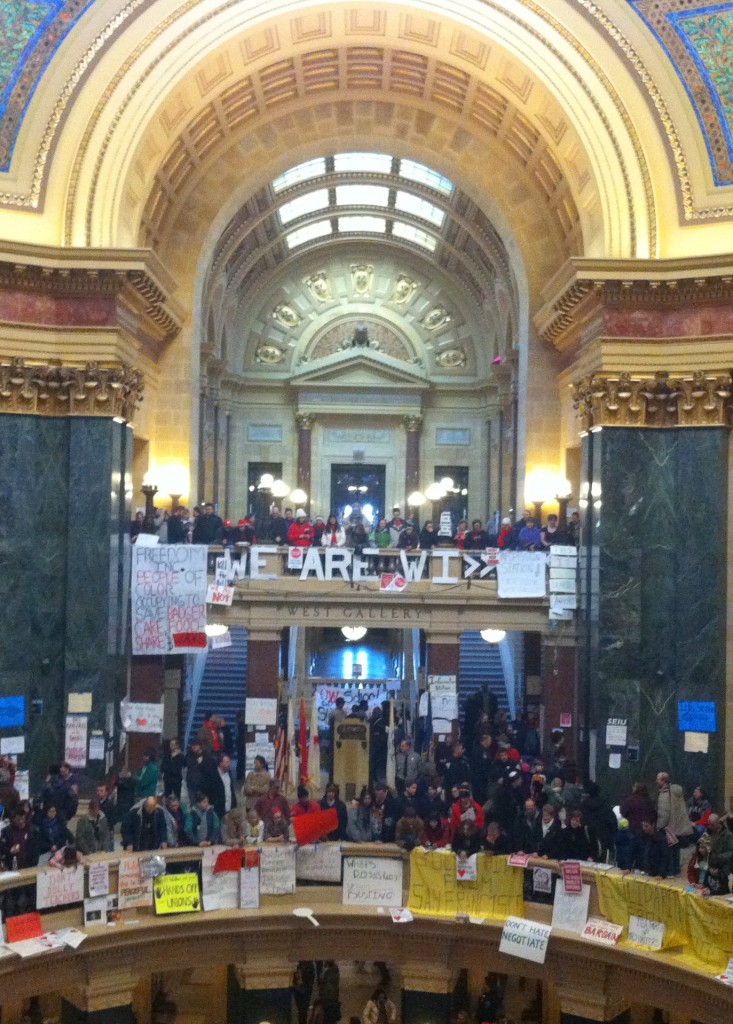“We are Wisconsin”: Building Collective Identity in the Wisconsin Protests
 They arrive on buses, in carpools, by bike, on foot. They hail from Neenah, Richland Center, Milwaukee, Rice Lake, Janesville, Delavan, Madison. They carry signs, push strollers, walk dogs, chant slogans, dance, sing, play instruments, and even do yoga in the rotunda of the Capitol. They are police officers, firefighters, nurses, snow plow drivers, teachers, construction workers, janitors, students, non-union members, Democrats, Republicans, Socialists, Libertarians. They are Wisconsin.
They arrive on buses, in carpools, by bike, on foot. They hail from Neenah, Richland Center, Milwaukee, Rice Lake, Janesville, Delavan, Madison. They carry signs, push strollers, walk dogs, chant slogans, dance, sing, play instruments, and even do yoga in the rotunda of the Capitol. They are police officers, firefighters, nurses, snow plow drivers, teachers, construction workers, janitors, students, non-union members, Democrats, Republicans, Socialists, Libertarians. They are Wisconsin.
In the past six days, as I have joined in the vibrant, energetic, and peaceful demonstrations of tens of thousands of people united against the Budget Repair Bill at the Wisconsin State Capitol, I have been struck by how those demonstrating against the bill have constituted a collective identity for themselves as Wisconsinites. Rhetorical scholars, building on the work of Michael Calvin McGee and Maurice Charland, recognize that collective identities are not a given, but constituted through discourse. While rhetorical scholars often examine how individual speakers or texts create identities for their audiences, it seems the collective identity being forged in the Wisconsin protests has not come from a centralized leader or group, but has been generated through diverse and diffuse signs, chants, videos, Facebook groups, Tweets, and other rhetorical acts.
Demonstrators invoke Wisconsin’s progressive history in creative and powerful ways. Signs and t-shirts remind others that Wisconsin led the way in labor laws and organizing, with slogans such as “Like the weekend? Thank Wisconsin.” This widely-circulated clip from the Rachel Maddow show summarizes Wisconsin’s history of labor leadership, and also features images and video of some of these signs. Demonstrators in LaCrosse, Wisconsin held a candlelight vigil for “the Death of the Labor Movement” on Thursday night that connected Wisconsin’s labor history to the dire future of the labor movement if the bill passes. Invoking this shared history provides demonstrators with a larger purpose for their actions, calling demonstrators to act to prevent, as one sign declared, “50 years of labor history [from being] undone in one week.”
In the East Gallery of the Capitol, a make-shift shrine has sprung up around the bust of Robert “Fighting Bob” La Follette, the Wisconsin Governor (1901-1906) and Senator (1906-1925) who ran for President in 1924 as the nominee of the Progressive Party, which was created as a vehicle for his nomination. Signs reading “What Would Bob Do?”, “The Spirit of Fighting Bob is Back,” and “Long Live La Follette” decorate the pedestal on which the bust sits. Invoking the spirit of “Fighting Bob” may have even more meaning for the protesters, since Governor Scott Walker broke the longstanding tradition of holding the inauguration ceremony in the East Gallery, and instead held his ceremony in the North Wing, where attendees had their backs to the legendary “Fighting Bob” bust. While Walker may have symbolically turned his back on the Wisconsin’s progressive history, the tens of thousands of protesters at the Capitol and throughout Wisconsin are using it to remind themselves that they are not only fighting for their own rights, but are also fighting to carry on the tradition of the generations of Wisconsinites who came before them.
Demonstrators also invoke a more recent event in Wisconsin history that brought them together two weeks ago around their televisions and brings them together again this week in front of the Capitol: the Green Bay Packers’ Super Bowl victory. Packers-themed signs permeate the demonstrations, declaring “Aaron Rogers is a Union Man,” “The Super Bowl was Won on Union Labor,” and “I Blame Favre.” Indeed, several current and former players for the only community-owned, non-profit professional sports team in the nation issued a statement opposing the bill and expressing solidarity with Wisconsin workers. Through the symbol of the Packers’ Super Bowl victory, demonstrators create an collective identity for themselves that not only draws them together around a common love for the Packers, but also forecasts a victory for unionized workers.
On her Facebook page on Friday, Sarah Palin offered an ominous warning, “As goes Wisconsin today, so goes the country tomorrow.” In response, tens of thousands of Wisconsin residents who oppose the Budget Repair Bill are declaring: we are Wisconsin. No matter what happens with the outcome of the Budget Repair Bill, there is a united movement of Wisconsin residents and their supporters nationwide forming around the the progressive values that have propelled the State of Wisconsin “Forward” since its founding in 1848.


